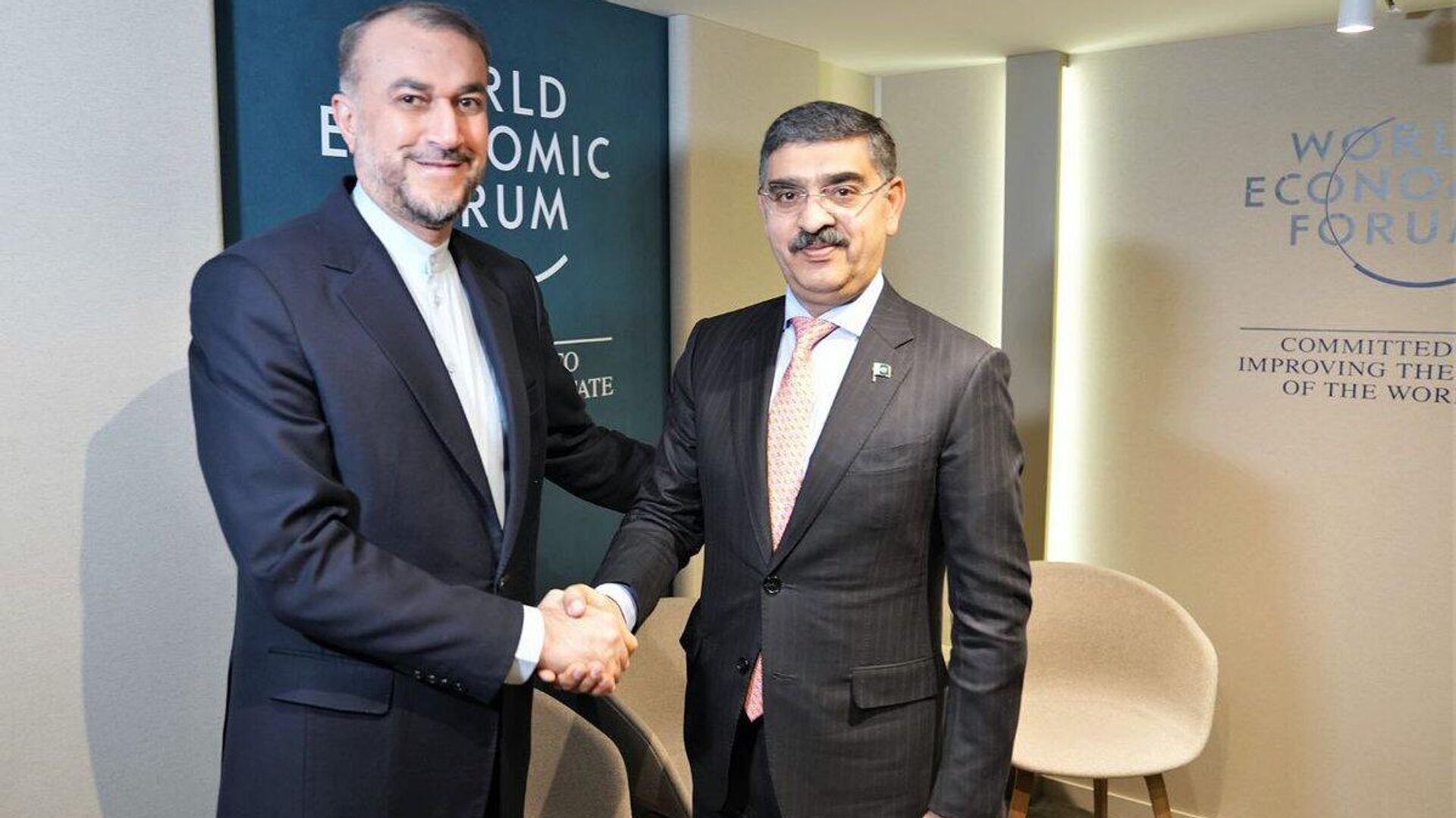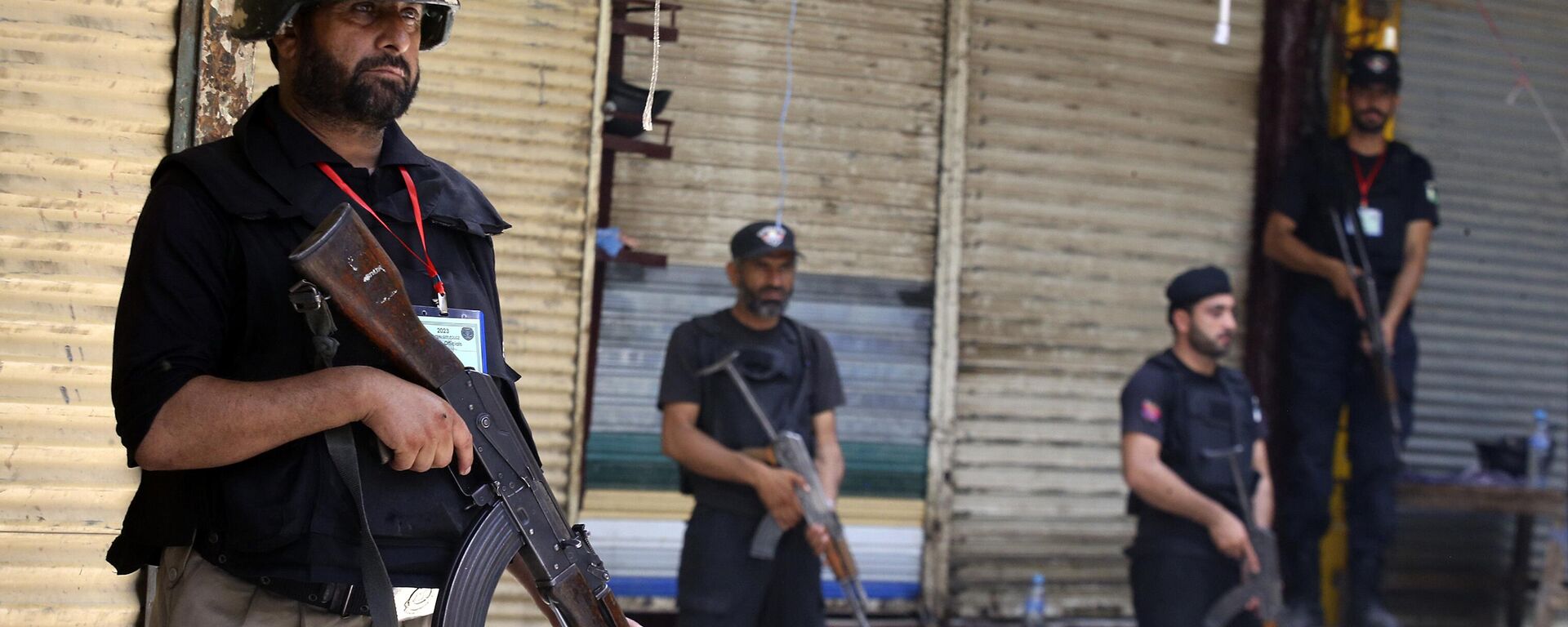https://sputniknews.in/20240118/will-multipolarity-win-over-great-power-rivalries-in-pak-iran-diplomatic-fallout-6240160.html
Will Multipolarity Win Over Great Power Rivalries in Pak-Iran Diplomatic Fallout?
Will Multipolarity Win Over Great Power Rivalries in Pak-Iran Diplomatic Fallout?
Sputnik India
Tensions have flared between Iran and Pakistan with recent attacks. Iran struck Jaish al-Ad JUD bases in Pakistan's Balochistan province, and Pakistan has retaliated by targeting Iran's southern region Sarawan, claiming to have killed Baloch Militants.
2024-01-18T15:40+0530
2024-01-18T15:40+0530
2024-01-18T16:13+0530
terrorism
iran
pakistan
balochistan
shanghai cooperation organisation (sco)
https://cdn1.img.sputniknews.in/img/07e8/01/11/6243119_0:35:1199:709_1920x0_80_0_0_b7c08944b9400a3c3f34aa685ba32668.jpg
The Iranian military's attack was reportedly a response to the deaths of 11 Iranian police force members last year, attributed to the notorious Sunni terror group, Jaish al-Adl, as per media reports.However, Pakistan has confirmed the attack as an unprovoked violation of its airspace and sovereignty, deeming it unacceptable. Consequently, the relationship between both countries has become strained, leading Pakistan to recall its Ambassador from Iran and advise the Iranian Ambassador to remain in place.Although, both neighboring and Muslim countries are the member of the multipolar organizations like Economic Cooperation Organization (ECO), and (Shanghai Cooperation Organisation (SCO).In this regard, China has issued a statement urging both sides to exercise caution and prevent the situation from escalating.Prioritizing Regional Peace and Stability in a Multipolar ContextAs members of multipolar organizations like SCO and ECO, both Muslim and neighboring states are urged to prioritize regional peace, stability, and multipolarity before taking any action. The current war-like situation in the Middle East and the suffering of Muslim states under the suppression, domination, and hegemony of imperialist states like the US and its allies highlight the need to avoid another regional conflict, especially between Muslim states.However, in the explanation of this attack by the Foreign Minister of Iran said to media, “We held many meetings with our Pakistani counterparts to address the threats posed by Jaish ul Adl, and our target was the militants of JUD; we respect Pakistan’s territorial integrity, and sovereignty but we do not let them take our security for granted.”Tensions Ease as Pakistan-Iran Relations Navigate Delicate BalanceOn Thursday, the Ministry of Foreign Affairs of Pakistan issued a press release strongly condemning the unprovoked violation of its airspace. In response, Islamabad has severed all diplomatic ties with Iran, including canceling a naval-based joint exercise that was scheduled to take place following the recent attack.However, on the other side, there are media reports that the Caretaker Prime Minister of Pakistan met with Iranian Minister of Science, Research, and Technology, Muhammad Ali Zolfigol, today in Davos to discuss the establishment of a science and technology park in Chahbahar. This suggests that both countries are still engaged in diplomatic discussions and may not completely sever their ties.In the regard, Sputnik India approached a senior journalist, Middle East and Defence expert Qamar Agha.Further he added,”Iran's main focus is the region and ensuring peace and stability within the country. At that moment they don't want any kind of 'nonsense' from Afghanistan and Pakistan."On the hand, in an interview with Pakistani news channel, Geo News, former foreign secretary Aizaz Ahmad Chaudhry strongly criticized the Iranian air attacks in Balochistan, describing them as a violation of Pakistan's territorial integrity.Additionally, He said to media, “I suggested the Pakistani government should critically review its national security policy and diplomatic options to maintain ties with its regional neighbors.”
https://sputniknews.in/20240117/origins-of-jaish-al-adl-militant-group-targeted-by-iran-6231764.html
iran
pakistan
balochistan
Sputnik India
feedback.hindi@sputniknews.com
+74956456601
MIA „Rossiya Segodnya“
2024
Muhammad Sharif
https://cdn1.img.sputniknews.in/img/07e7/0b/05/5257054_0:0:443:444_100x100_80_0_0_b8bd2af32be62a6eecdb4a84c7fd978f.jpg
Muhammad Sharif
https://cdn1.img.sputniknews.in/img/07e7/0b/05/5257054_0:0:443:444_100x100_80_0_0_b8bd2af32be62a6eecdb4a84c7fd978f.jpg
News
en_IN
Sputnik India
feedback.hindi@sputniknews.com
+74956456601
MIA „Rossiya Segodnya“
Sputnik India
feedback.hindi@sputniknews.com
+74956456601
MIA „Rossiya Segodnya“
Muhammad Sharif
https://cdn1.img.sputniknews.in/img/07e7/0b/05/5257054_0:0:443:444_100x100_80_0_0_b8bd2af32be62a6eecdb4a84c7fd978f.jpg
iran-pak tensions, iran-pakistan
iran-pak tensions, iran-pakistan
Will Multipolarity Win Over Great Power Rivalries in Pak-Iran Diplomatic Fallout?
15:40 18.01.2024 (Updated: 16:13 18.01.2024) Tensions have flared between Iran and Pakistan with recent attacks. Iran struck Jaish al-Ad JUD bases in Pakistan's Balochistan province, and Pakistan has retaliated by targeting Iran's southern region Sarawan, claiming to have killed Baloch Militants.
The Iranian military's attack was reportedly a response to the deaths of 11 Iranian police force members last year, attributed to the notorious Sunni terror group, Jaish al-Adl, as per media reports.
However, Pakistan has confirmed the attack as an unprovoked violation of its airspace and sovereignty, deeming it unacceptable. Consequently, the relationship between both countries has become strained, leading Pakistan to recall its Ambassador from Iran and advise the Iranian Ambassador to remain in place.
In this regard, Mumtaz Zahra Baloch, the spokeswoman for foreign affairs, expressed grave concern, stating, "This violation of Pakistan's sovereignty is completely unacceptable and can have serious consequences. It is even more concerning that this illegal act has taken place despite the existence of several channels of communication between Pakistan and Iran."
Although, both neighboring and Muslim countries are the member of the multipolar organizations like Economic Cooperation Organization (ECO), and (Shanghai Cooperation Organisation (SCO).
In this regard, China has issued a statement urging both sides to exercise caution and prevent the situation from escalating.
Prioritizing Regional Peace and Stability in a Multipolar Context
As members of multipolar organizations like SCO and ECO, both Muslim and neighboring states are urged to prioritize regional peace, stability, and multipolarity before taking any action. The current war-like situation in the Middle East and the suffering of Muslim states under the suppression, domination, and hegemony of imperialist states like the US and its allies highlight the need to avoid another regional conflict, especially between Muslim states.
Both nations are already confronting American suppression, sanctions, domination, and hegemony in the region. Engaging in conflict with each other would create a power vacuum, allowing other states to take advantage of the situation. By participating in regional organizations such as the SCO and ECO, they can work together to address these challenges.
However, in the
explanation of this attack by the Foreign Minister of Iran said to media, “We held many meetings with our Pakistani counterparts to address the threats posed by Jaish ul Adl, and our target was the militants of JUD; we respect Pakistan’s territorial integrity, and sovereignty but we do not let them take our security for granted.”
Tensions Ease as Pakistan-Iran Relations Navigate Delicate Balance
On Thursday, the Ministry of Foreign Affairs of Pakistan issued a press release strongly condemning the unprovoked violation of its airspace. In response, Islamabad has severed all diplomatic ties with Iran, including canceling a naval-based joint exercise that was scheduled to take place following the recent attack.
However, on the other side, there are media reports that the Caretaker Prime Minister of Pakistan met with Iranian Minister of Science, Research, and Technology, Muhammad Ali Zolfigol, today in
Davos to discuss the establishment of a science and technology park in Chahbahar.
This suggests that both countries are still engaged in diplomatic discussions and may not completely sever their ties.
In the regard, Sputnik India approached a senior journalist, Middle East and Defence expert Qamar Agha.
“I believe,Pakistan is unlikely to confront Iran due to its financial constraints and primary focus on the Kashmir issue. The country relies on Iran for crucial supplies such as oil, gas, and electricity, given its economic challenges and impending collapse. This is not the first instance of such tensions, as Iran has previously cautioned Pakistan about militant activities. Additionally, Iran maintains a zero-tolerance policy towards militancy, further influencing Pakistan's approach to the situation, he remarked”
Further he added,
”Iran's main focus is the region and ensuring peace and stability within the country. At that moment they don't want any kind of 'nonsense' from Afghanistan and Pakistan."On the hand, in an interview with Pakistani news channel,
Geo News, former foreign secretary
Aizaz Ahmad Chaudhry strongly criticized the Iranian air attacks in Balochistan, describing them as a violation of Pakistan's territorial integrity.
“He emphasized that while terrorism poses a shared threat to both neighboring states, it is essential to refrain from breaching territorial boundaries. The diplomat urged Iran to avoid unilateral actions and emphasized that such actions do not contribute to improving the situation. Both countries work jointly against terrorism and militant groups.”
Additionally, He said to media, “I suggested the Pakistani government should critically review its national security policy and diplomatic options to maintain ties with its regional neighbors.”



